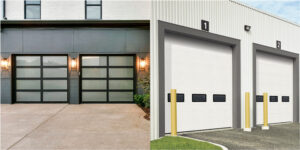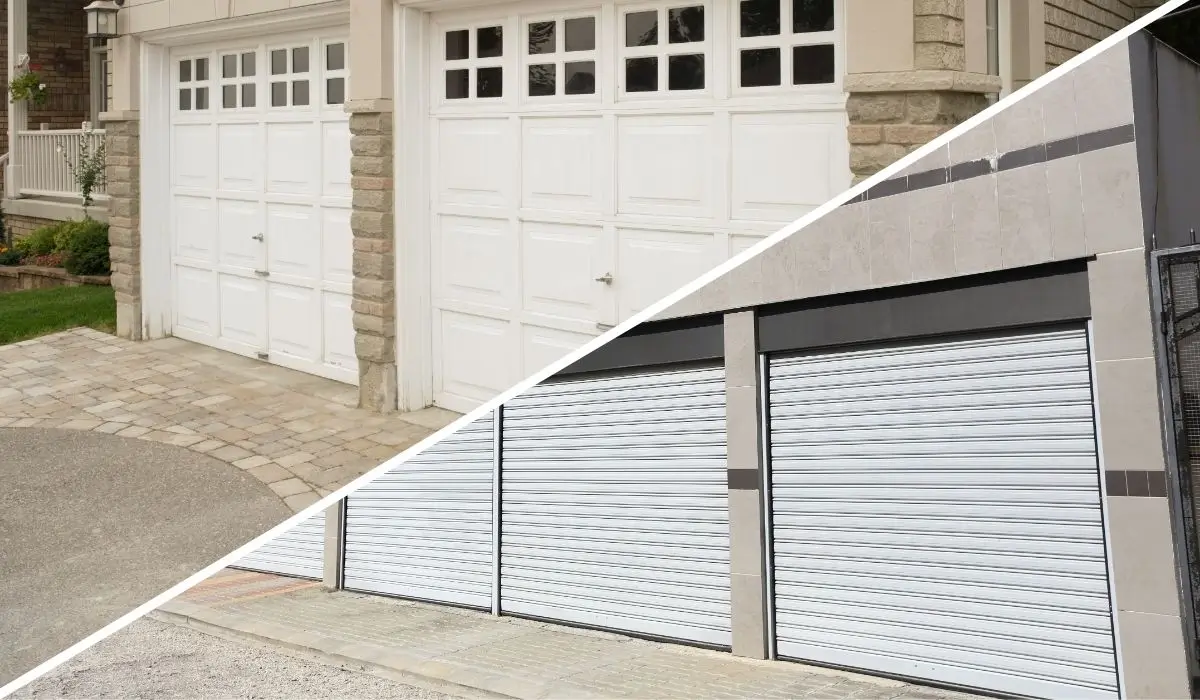
7 Shocking Differences Between Commercial vs Residential Garage Doors
 When it comes to choosing a garage door, understanding the differences between commercial vs residential garage doors is essential. Many people assume that all garage doors are the same, but the reality is quite the opposite. These two types serve vastly different purposes and come with their own structural, design, and operational features. Whether you’re outfitting a business facility or upgrading your home garage, knowing the key distinctions can help you make the right investment. From durability to security and automation to aesthetics, we’ll uncover the surprising contrasts between commercial vs residential garage doors. Let’s explore how these door types meet the unique needs of homes and businesses.
When it comes to choosing a garage door, understanding the differences between commercial vs residential garage doors is essential. Many people assume that all garage doors are the same, but the reality is quite the opposite. These two types serve vastly different purposes and come with their own structural, design, and operational features. Whether you’re outfitting a business facility or upgrading your home garage, knowing the key distinctions can help you make the right investment. From durability to security and automation to aesthetics, we’ll uncover the surprising contrasts between commercial vs residential garage doors. Let’s explore how these door types meet the unique needs of homes and businesses.
Purpose and Use – Functionality at the Core
The most apparent difference in commercial vs residential garage doors is their intended use. Residential doors are primarily used for personal garages—protecting family vehicles, providing storage access, and complementing a home’s exterior. These doors focus on aesthetics, user-friendly operation, and integration with smart home systems. Their materials and insulation are tailored for comfort and curb appeal.
In contrast, commercial garage doors are designed for utility, performance, and high traffic. They’re used in warehouses, auto shops, fire stations, and other industrial settings. These doors must endure frequent use, large equipment, and sometimes hazardous environments. Because of that, commercial vs residential garage doors vary in build quality and engineering.
-
Residential doors prioritize home design and style
-
Commercial doors focus on strength and durability
-
Frequent use demands stronger components in commercial setups
-
Residential doors often feature smart integration
-
Commercial doors may include roll-up or sectional types
-
Residential doors operate quietly and smoothly
Size and Dimensions – Scale Matters
Another striking distinction between commercial vs residential garage doors lies in their size. Residential garage doors are built to fit standard home garage openings—typically 7 to 8 feet high and 8 to 16 feet wide. These dimensions accommodate common vehicles such as cars, SUVs, and small trucks. The focus here is usability and ease of daily operation.
Commercial garage doors are much larger and vary significantly in size depending on the business’s needs. You’ll often see heights of 12 feet or more, with widths that allow for the passage of trucks, forklifts, and industrial equipment. These larger sizes make commercial doors more complex to install and maintain, reinforcing the importance of expert garage door installation services.
-
Residential doors come in standard home sizes
-
Commercial doors are built to custom specifications
-
Larger size increases insulation and load-bearing needs
-
Requires stronger openers and tracks in commercial setups
-
Residential doors cater to small vehicle access
-
Commercial setups often include multiple wide bays
Materials and Construction – Built for the Job
The commercial vs residential garage doors conversation wouldn’t be complete without discussing materials. Residential doors typically feature wood, steel, fiberglass, or vinyl, often selected based on visual appeal and weather resistance. These materials suit a homeowner’s style while maintaining decent insulation and strength.
On the other hand, commercial garage doors are made from heavy-duty steel or reinforced aluminum for maximum durability. They often include added insulation layers and high-strength components to withstand intensive use. This makes them ideal for climate-controlled warehouses, loading docks, and industrial zones where the door is constantly in motion.
Another thing to consider is the construction style. Residential doors are often paneled or carriage-style, giving a cozy or rustic feel to the home. In contrast, commercial doors tend to be sectional or rolling steel models that prioritize function over form. Both types can be insulated, but commercial vs residential garage doors have very different structural priorities.
Lastly, commercial doors must meet local business codes and safety regulations, adding another layer of engineering complexity. This includes fire ratings, high-wind resistance, and security features that most residential garages don’t require. These distinctions affect cost, installation time, and long-term maintenance needs.
Durability and Lifespan – Performance Over Time
Commercial vs residential garage doors also differ in expected lifespan and durability. Residential doors, when properly maintained, can last 15 to 30 years. Their longevity depends on materials used, exposure to weather, and mechanical components. Basic upkeep like spring replacements, lubrications, and occasional panel repairs can extend their life significantly.
In contrast, commercial garage doors are built for constant, heavy-duty usage. They often operate hundreds of times per day in fast-paced environments. As a result, these doors are engineered with thicker materials, reinforced tracks, and commercial-grade openers to handle the stress. Proper garage door maintenance is critical to avoid costly repairs or downtime in a business setting.
-
Residential doors are built for 2-4 uses per day
-
Commercial doors endure dozens to hundreds of cycles daily
-
Stronger materials ensure longer commercial door lifespan
-
Commercial-grade parts resist wear and tear
-
Residential doors require seasonal maintenance
-
Lifespan varies based on usage and material
Insulation and Energy Efficiency – Comfort vs Utility
Insulation is another area where commercial vs residential garage doors significantly differ. For homeowners, garage insulation affects indoor temperature, energy efficiency, and even noise reduction. Insulated residential doors keep the garage more comfortable, especially when attached to living spaces. Materials like polyurethane or polystyrene cores are common in premium models.
Businesses have varying insulation needs. In temperature-sensitive environments like food storage or medical facilities, insulation is a high priority. In other cases, insulation may be secondary to durability. Regardless, manyc include heavy-duty insulation to reduce energy loss, protect goods, and improve workplace efficiency.
Insulated doors also help control sound, which is valuable in both residential and commercial settings. But while homes may use insulated doors for comfort, commercial buildings often do so to meet regulatory and operational requirements. Commercial vs residential garage doors serve different goals when it comes to thermal control.
Another factor is sealing. Residential garages rely on weather stripping to keep out dust and moisture. Commercial setups may use industrial-grade seals or thresholds to keep controlled environments stable. Choosing the right door insulation impacts not just comfort, but also long-term operating costs.
Design and Aesthetic Appeal – Curb Appeal vs Professionalism
When homeowners shop for garage doors, aesthetics play a huge role. Residential garage doors come in a variety of styles—carriage, modern, classic, and more. You can customize windows, paneling, hardware, and color to match your home’s architecture. These doors are designed to enhance curb appeal while offering functional features like smart access and quiet operation.
Commercial garage doors, by contrast, are built with utility in mind. You’ll often find minimalistic designs, opaque panels, or see-through aluminum/glass doors used in showrooms. The goal is less about beauty and more about accessibility and efficiency. Still, businesses like retail spaces or restaurants sometimes opt for custom commercial doors that combine form and function.
-
Residential doors enhance home design
-
Commercial doors prioritize functionality
-
Homeowners have more aesthetic options
-
Business doors follow brand consistency or safety standards
-
Custom commercial doors possible with glass/aluminum
-
Aesthetics are a primary concern for residential buyers
Security and Safety – Protecting What Matters
Security plays a major role in commercial vs residential garage doors. Homeowners typically want doors that deter intruders, operate quietly, and integrate with home security systems. Features like auto-locking mechanisms, motion sensors, and keypad access are common. These features make garage door services essential for homeowners looking to secure their property.
Businesses need more robust security features to protect high-value inventory, equipment, and personnel. Commercial garage doors often feature industrial-grade locks, alarm integration, and reinforced frames. Fire-resistant and wind-resistant certifications are also necessary in many commercial environments, especially in areas prone to natural disasters or vandalism.
Another major safety factor is the opener system. Residential systems focus on smooth and quiet operation. Commercial openers need high torque and rapid cycling capacity. Both systems require safety sensors, but commercial vs residential garage doors have different thresholds for safety compliance and operational risk.
-
Residential systems integrate with smart security
-
Commercial setups use high-security access systems
-
Fire-rated doors available for businesses
-
Reinforced materials prevent break-ins
-
Auto-reverse sensors for safety
-
Customized security based on property type
Maintenance Requirements – Upkeep You Can’t Ignore
Ongoing garage door maintenance differs between commercial vs residential garage doors. Residential setups typically require periodic lubrication, spring adjustments, and visual inspections. Homeowners can often perform these tasks with minimal tools, although professional tune-ups are recommended yearly.
Commercial garage doors need more frequent and technical maintenance due to the intensity of their use. Downtime in a commercial setting can halt operations, making reliability critical. Businesses often contract routine maintenance services to inspect tension systems, cables, rollers, and insulation.
-
Homeowners can perform basic maintenance themselves
-
Businesses need routine professional inspections
-
Commercial doors face more wear and tear
-
Annual service recommended for residential doors
-
Emergency repair services more common in commercial setups
-
Maintenance impacts longevity and performance
Get in Touch with Williams Garage Doors Today
Whether you’re dealing with a home garage or outfitting a commercial facility, understanding the difference between commercial vs residential garage doors is the first step to making the right choice. At Williams Garage Doors, we specialize in both residential and commercial garage door solutions tailored to your specific needs.
📞 Call us in PA at 215-792-4424 or in NJ at 856-606-2937
🌐 Visit our official website: https://williams-garagedoors.com
📧 Email us directly at williamsgaragedoors1@gmail.com
Let our team guide you through the best options for garage door installation, materials, automation, and maintenance—whether you’re securing your home or enhancing your business.



